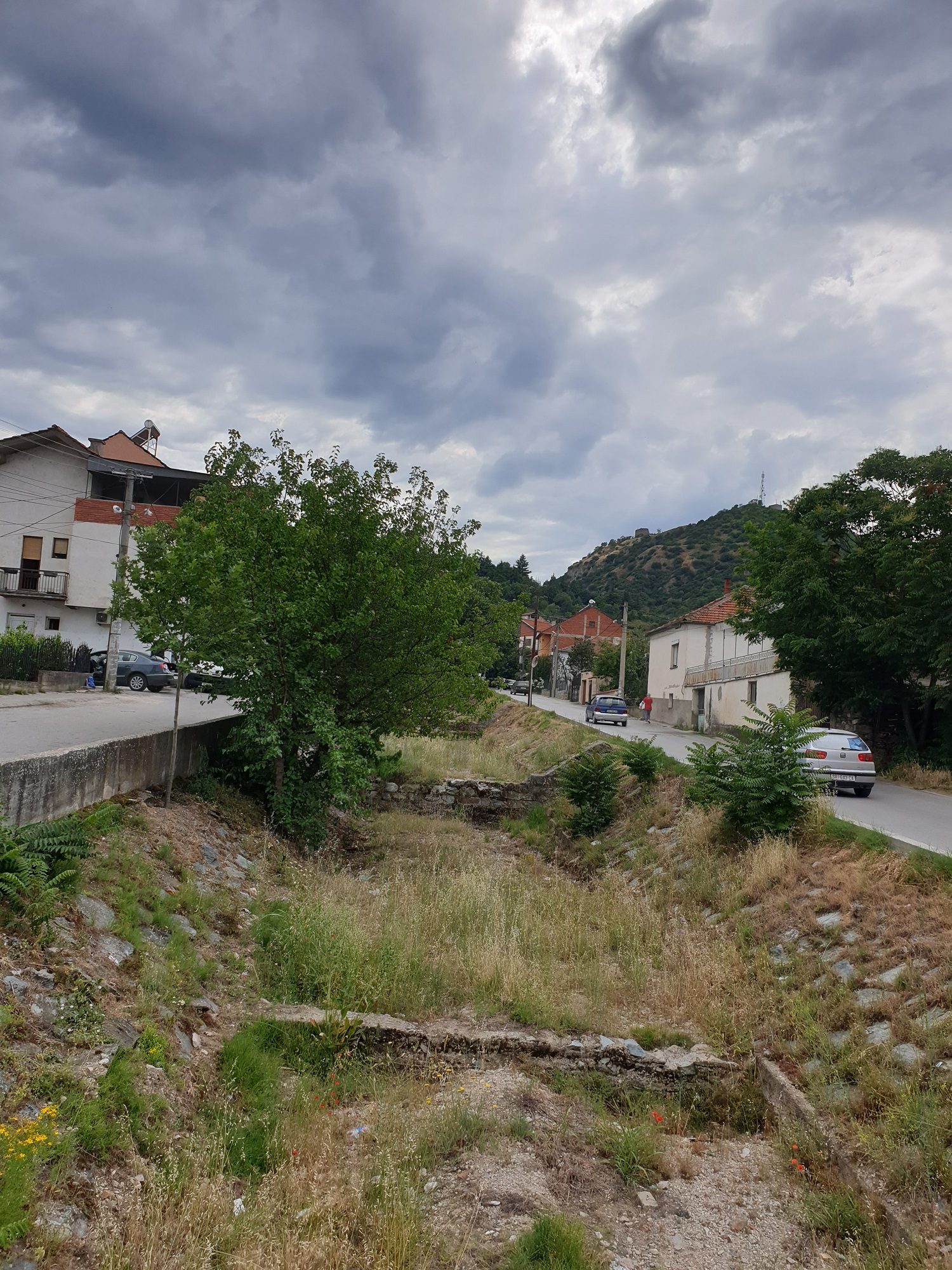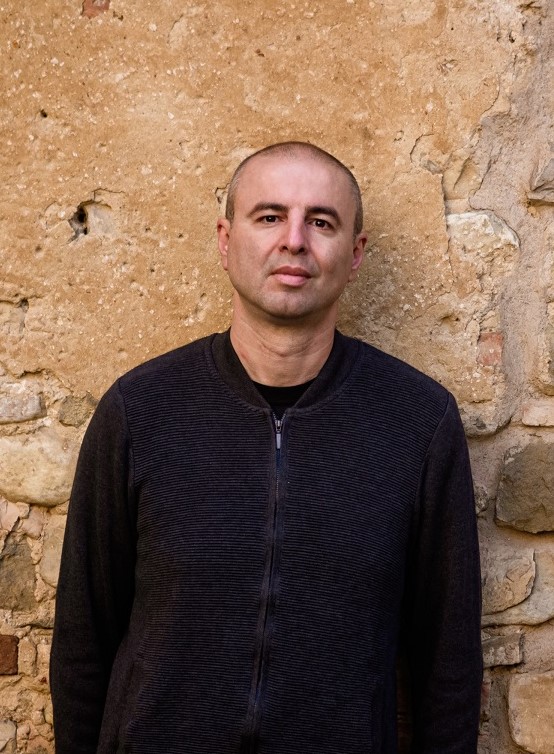Откинато парче бесмртност
Градот е нем кога заминувам од него. Ја нема веќе мајка ми да фрли чаша вода по моите стапки кога го напуштам домот, за да ми течат патувањата лесно и чисто како неоткриена река. Не ѝ кажав дека во атласите ги барав само реките понорници преку кои го осознавав релјефот на подземниот свет кој никој не сакаше да го означи на мапите, а постоеше само во митовите или соновите како казна за оние кои нема да го достигнат врвот на нормираните земни идеологии. По дваесетина години постојано отсуство, се вратив во родната Струмица, нем пред сопствениот страв од постојаност. Истите дрвја, други споменици, нови локални политички херои кои раскажуваа за истата иднина која никогаш нема да се случи. Честопати минувам покрај каналот кој беше аортата на градот што низ себе ги носи камењата, тајните од најблиските ридови, секогаш кога силно ќе заврне. Стравот од поплави ги чуваше улиците да останат широки без збиени згради, како што стравот од пандемијата е чувар на плоштадот од политички кампањи и митинзи. Се враќав во детството каде експанзијата на времето не е трошење на животот, туку чиста потрага по него. Ако имав песочен часовник во рацете, ќе зборував за течението на песокот, не за времето.
Честопати ја сонувам мојата мртва мајка како со ќесиња полни овошје се враќа од пазарот, а јас трчам кон полињата со кајсии. Татко ми пред некој ден со нејзината стара четка за заби ги чистеше рамката околу нејзината слика на гробниот камен и буквите од сопственото име кои однапред ги изгравира веднаш до нејзиното име. Социјализмот го научи да планира сè, па дури и сопствената смрт. Мојот син, пак, кој порасна со константите на виртуелното постоење, ми постави прашање зошто улицата на која живее се вика „Никола Тесла”, а е најтемна во градот и зошто таблата со името на градителот на светлината е залепена врз распадната куќа во која живее темницата? Во неговите очи ги гледав сопствените прашања за динамиката, сомнежите и стравовите кон светот. Токму стравот од болеста ги врати луѓето во нивните градови на раѓањето, со мисла дека се тука побезбедни, но само се поблизу до гробот во кој сакаат да бидат закопани. Закопани тука, со главата насочена кон Ерусалим, кон Исток, иако цел живот со погледот се свртени кон Запад. Се приближуваат државните парламентарни избори и ќе се зборува пак за тоа на која страна на светот припаѓа Западниот Балкан, надвор од географските координати. Но, овој пат пандемијата ќе ги исчисти плоштадите од лаги.
Кога сега минувам покрај празниот канал обраснат со треви, на небото над него ми се пресликуваат сите летала кои ги кревавме оттука како деца, без страв дека ќе завршат засекогаш закачени на ТВ-антените кои како ребра на распнат неверник се издигаа од секој црвен покрив. Пишувањето е само обид за доближување на нештата кои ни се оддалечиле од видот и мислата, на начин на којшто мислиме дека цврстото и болно стегање на парчето коноп в рака ќе ни го врати откинатото летало, откинатото парче бесмртност.
Ein davongeflogenes Stück Unsterblichkeit
Die Stadt bleibt stumm, wenn ich aus ihr wegfahre. Meine Mutter ist nicht mehr da, um ein Glas Wasser hinter meinen Schritten auszuschütten, wenn ich das Haus verlasse, auf dass meine Reisen so leicht und klar dahinfließen wie ein unentdeckter Fluss. Ich habe ihr nicht gesagt, dass ich in den Atlanten immer nur nach den unterirdischen Flüssen suchte, anhand derer ich das Relief der Unterwelt erkennen konnte, die niemand auf den Karten verzeichnen wollte, sondern die nur in Mythen oder Träumen als Bestrafung für jene existierte, die den Gipfel der genormten irdischen Ideologien nicht erreichen würden. Nach zwanzig Jahren ständiger Abwesenheit kehrte ich ins heimische Strumica zurück, stumm angesichts der eigenen Angst vor Beständigkeit. Dieselben Bäume, andere Denkmäler, neue lokale politische Helden, die über dieselbe Zukunft sprachen, die nie eintreten wird. Oft gehe ich am Kanal vorbei, der einst Hauptschlagader der Stadt war, die das Geröll, die Geheimnisse der nächstgelegenen Hügel, wann immer es stark regnet, durch sich hindurchschleust. Die Angst vor Überschwemmungen sorgte dafür, dass die Straßen breit und ohne dichte Bebauung blieben, so wie die Pandemie dafür sorgt, dass die Plätze von politischen Kampagnen und Meetings verschont bleiben. Ich kehrte in meine Kindheit zurück, wo die Ausdehnung der Zeit keine Verschwendung des Lebens war, sondern die reine Suche nach selbigem. Hielte ich eine Sanduhr in Händen, ich würde über das Rieseln des Sandes sprechen, nicht über die Zeit.
Oft träume ich von meiner toten Mutter, wie sie mit Tüten voller Obst vom Markt zurückkommt, doch ich renne auf die Felder mit den Aprikosenbäumen zu. Mein Vater putzte vor einigen Tagen mit ihrer alten Zahnbürste den Rahmen um ihr Foto auf dem Grabstein und die Buchstaben seines eigenen Namens, den er vorher direkt neben ihren hatte eingravieren lassen. Der Sozialismus hat ihn gelehrt, alles vorauszuplanen, selbst den eigenen Tod. Mein Sohn wiederum, der mit den Konstanten der virtuellen Existenz aufgewachsen ist, stellte mir die Frage, warum die Straße, in der er lebt, „Nikola Tesla“ heißt und die dunkelste in der Stadt ist und warum das Schild mit dem Namen des Schöpfers des Lichts an einem verfallenen Gebäude angebracht ist, in dem die Dunkelheit zu Hause ist? In seinen Augen sah ich meine eigenen Fragen an die Welt zu Dynamik, zu Zweifeln und Ängsten. Gerade die Angst vor Krankheit brachte die Menschen zurück in die Städte ihrer Geburt, mit dem Gedanken, dass sie hier sicherer wären, doch sind sie nur näher bei dem Grab, in dem sie beerdigt werden wollen. Hier beerdigt, der Kopf zeigt nach Jerusalem, nach Osten, auch wenn sie ihr ganzes Leben lang den Blick nach Westen gerichtet haben. Die Parlamentswahlen kommen näher, und man wird wieder darüber sprechen, zu welcher Seite der Welt der Westbalkan gehört, abseits seiner geographischen Koordinaten. Doch diesmal wird die Pandemie die Plätze von den Lügen säubern.
Wenn ich jetzt am leeren Kanal vorbeigehe, der von Gras überwachsen ist, würde ich gern am Himmel über ihm alle Drachen nachzeichnen, die wir hier als Kinder steigen ließen, ohne Angst, dass sie für immer an den Fernsehantennen hängend enden würden, die sich wie die Rippen eines gekreuzigten Ungläubigen von jedem roten Dach erhoben. Das Schreiben ist nur ein Versuch einer Annäherung an die Dinge, die wir aus dem Blick verloren haben, die unserem Denken jetzt ferner liegen, auf die Art und Weise, auf die wir glauben, dass uns das krampfhafte Umklammern des Stückchens Schnur den davongeflogenen Drachen wiederbringen wird, das davongeflogene Stück Unsterblichkeit.
Übersetzung: Alexander Sitzmann
A torn piece of immortality
The city stays silent when I depart. My mother is no longer here to splash a glass of water behind my steps when I leave the house, so that my journeys may flow easily and clearly like an undiscovered river. I didn’t tell her that in the atlases I would only search for the subterranean rivers through which I got acquainted with the relief of the underground world that was left unmarked on the maps, that existed only in myths or dreams as a punishment for those who failed to reach the peak of defined earthly ideologies. After about twenty years of constant absence, I returned to my native city of Strumica, keeping silent before my own fear of constancy. Same trees, different monuments, new local political heroes telling stories about the very same future that will never happen. I often walk along the canal that used to be the city’s aorta carrying along the stones, the secrets from nearby hills, whenever there was pouring rain. The fear of floods preserved the streets, which remain wide and not cluttered with buildings, just as the fear from the pandemic guards the square from political campaigns and meetings. I returned to the childhood where the expansion of time is not a waste of life but a pure quest for it. If I held an hourglass in my hands, I would be talking about the flow of sand, not about time.
Often in my dreams I see my dead mother coming home with bags full of fruits, while I run towards the apricot orchards. A couple of days ago my father used her old toothbrush to clean the edges of her picture frame on the gravestone and the letters of his own name engraved next to her name. Socialism has taught him to plan everything, even his own death. My son, on the other hand, who grew up with the constants of virtual reality, once asked me why the street where he lives is named “Nikola Tesla” despite being the darkest street in town, and how come that the street plate bearing the name of the designer of light is attached to the walls of a half-ruined house where darkness dwells? In his eyes I could see my own questions about the dynamics, doubts and fears towards the world. It is indeed the fear of the disease that made people return to their cities of birth, with the thought that here they are safer, but in fact they are now only closer to the grave where they would like to be buried. Buried here, with their heads turned to Jerusalem, to the East, although for their entire lives they were heading to the West. The state parliament elections are approaching and once again we will be hearing speeches about to which side of the world West Balkans belongs, beyond all geographical coordinates. Only this time the pandemic will clean up the squares from lies.
Whenever I pass by the canal overgrown with grass, in the sky above the canal I can see the reflection of all the kites that we used to navigate from here, never fearing that they might get stuck forever on the TV antennas that rise from the red roofs like ribs of a crucified unbeliever. Writing is merely an attempt to approach the things growing distant from our sights and thoughts in a way that makes us believe that the tight and painful grasp of the piece of rope in our hand will bring us back the torn kite, the torn piece of immortality.
Translation: Makedonka Bozhinovska
Share
-
28 Mittwoch
Hausgäste
Lesung: Nikola Madzirov und Tadeusz Dąbrowski
Moderation: Jan Wagner
Veranstaltungen mit Nikola Madzirov
2012
November












